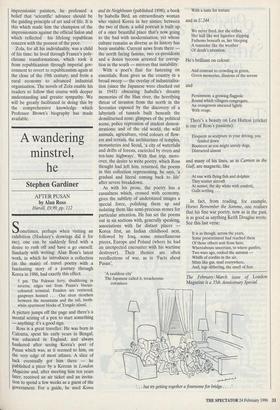A wandering minstrel, he
Stephen Gardiner
Al, 1ER PUSAN by Alan Ross Harvill, £9.99, pp. 112 Sometimes, perhaps when visiting an exhibition (Hockney's drawings did it for me), one can be suddenly fired with a desire to rush off and have a go oneself. Similarly with writing: Alan Ross's latest work, in which he introduces a collection (in the main) of travel poetry with a fascinating story of a journey through Korea in 1986, had exactly this effect.
5 pm. The Pukwan ferry, shuddering in reverse, edges out from Pusan's biscuit- coloured terminal. Fenders are retrieved, gangways hoisted .. . Our siren ricochets between the mountains and the tall, tooth- white apartment blocks of Yongdo island.
A picture jumps off the page and there's a mental seizing of a pen to start something — anything: it's a good sign.
Ross is a great traveller. He was born in Calcutta, spent his early years in Bengal, was educated in England, and always hankered after seeing Korea's port of Pusan which was, as it seemed to him, on the very edge of most atlases. A slice of luck eventually got him there — he Published a piece by a Korean in London Magazine and, after meeting him ten years later, received an air ticket and an invita- tion to spend a few weeks as a guest of the government. For a guide, he used Korea and its Neighbours (published 1898), a book by Isabella Bird, an extraordinary woman who visited Korea in her sixties; between the two of them, a solid portrait is built up of a once beautiful place that's now going to the bad with modernisation, yet whose culture remains as diverse as its history has been unstable. Current news from there the north facing famine, two ex-presidents and a dozen tycoons arrested for corrup- tion in the south — mirrors that instability.
With a poet's flair for fastening on essentials, Ross gives us the country in a broad sweep — the overlay of industrialisa- tion (since the Japanese were chucked out in 1945) obscuring Isabella's dreamy memories of the Han river, the horrifying threat of invasion from the north in the Seventies exposed by the discovery of a labyrinth of tunnels built beneath the demilitarised zone; glimpses of the political scene, police repression of student demon- strations; and of the old world, the wild animals, agriculture, vivid colours of flow- ers and terrain, the architecture of temples, monasteries and Seoul, 'a city of waterfalls and drifts of forests, encircled by rivers and ten-lane highways'. With that trip, more- over, the desire to write poetry, which Ross thought had left him, returned, the poems in this collection representing, he says, 'a gradual and literal coming back to life' after severe breakdown.
As with his prose, the poetry has a casualness which, crossed with economy, gives the subtlety of understated images a special force, polishing them up and isolating them like semi-precious stones for particular attention. He has set the poems out in six sections with, generally speaking, associations with far distant places Korea first, an Indian childhood next, followed by Iraq, some miscellaneous pieces, Europe and Poland (where he had an unexpected encounter with his wartime destroyer). Their themes are often recollections of war, as in 'Facts about Pusan',
'A cauldron city' The Japanese called it, treacherous colonisers With a taste for torture and in U.244 We never fired, nor she either, Her hull like wet liquorice slipping Fathoms beneath us, her bleeping A reminder like the weather Of death's attention.
He's brilliant on colour:
And contrast to crowding in green, Green memories, illusions of the serene
and
Persimmon: a growing flagpole Round which villagers congregate, An orangeness smeared lightly With rouge.
There's a beauty on Len Hutton (cricket is one of Ross's passions):
Eloquent as sculpture in your driving, you fended down Bouncers as you might unruly dogs, Distracted almost
and many of his lines, as in Carriers in the Gulf, are magnetic, like
At one with flying fish and dolphin They scatter aircraft At sunset, the sky white with confetti, Gulls settling .. .
In fact, from reading, for example, Horses Remember the Somme, one realises that his fine war poetry, now as in the past, is as good as anything Keith Douglas wrote. See this last verse:
It is as though, across the years, Some presentiment had reached them Of those others sent from here, Whereabouts uncertain, to where gunfire, Two wars ago, rocked the autumn Whiffs of cordite in the air, Mists like gas, mud everywhere, And, legs slithering, the smell of fear.
The February/March issue of London Magazine is a 35th Anniversary Special.
. . but try getting together a foursome for bridge . . .


























































 Previous page
Previous page